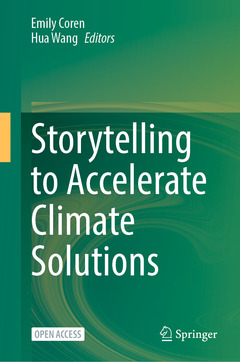Storytelling to Accelerate Climate Solutions, 1st ed. 2024

The climate is changing faster than our cultural practices are adapting to it. This Open Access volume, co-edited by Emily Coren (a science communicator) and Hua Wang (a communication scientist), presents a survey of the latest in agency-focused climate storytelling. Together, practitioners and scholars across different fields shared their knowledge, experience, and insight about how stories can be designed and told to engage, enable, and empower individuals and communities in climate communication and action. You will learn a wide range of narrative strategies and exemplary applications of climate storytelling in terms of professional practices (e.g., education, literature, journalism, popular media), genres and formats (e.g., drama, comedy, fiction), media platforms (e.g., television, radio, mobile), and communication modalities (e.g., text, visual, audio, multisensory).
Entertainment-education has been proven over decades to be an effective tool for social and behavior change in the public health sphere and has not yet been applied at scale to the massive ongoing climate?related disasters that we need to solve now, fast. There is an urgent need to rapidly apply and adapt public engagement tools for climate communication to speed up our response times for climate change mitigation and adaptation. This book takes a snapshot of where climate storytelling is currently at, describes where it fits within a climate communication landscape, and supports the next steps of its development. It facilitates the of creation climate storytelling efficiently by sharing and amplifying what is working well, and building collaborations between practitioners and researchers.This is an open access book.
Emily Coren is a science communicator and an affiliate in the Department of Psychiatry and Behavioral Sciences at Stanford University where she has been working to adapt entertainment-education strategies for health promotion and social change to create more effective climate communication. She has a B.S. in Ecology and Evolutionary Biology and is a certified professional Science Illustrator. She has worked in science communication for 15 years, contributing to collections at the Smithsonian Institution’s Museum of Natural History, consulting on a World Health Organization clean air campaign, and developing educational content for children’s films. Over the last six years, her work has led to new methods in developing frameworks at a national level, connecting community-led experiences to federal, local, and non-profit sector programs for climate change communication. She is a member of the National Association of Science Writers and the Society of Environmental Journalists.
Hua Wang is a communication scientist who is passionate about using innovative strategies for health promotion, behavior change, and social justice. She specializes in the design, implementation, and evaluation of initiatives that leverage powerful storytelling, emerging technologies, and communication networks to facilitate positive change, particularly in the field of entertainment-education. She holds a Ph.D. from University of Southern California’s Annenberg School for Communication & Journalism and is currently Professor of Communication at the University at Buffalo, The State University of New York. Her interdisciplinary research has been funded by federal agencies, private foundations, and nonprofit organizations, appeared in high-impact journals, and received prestigious awards from the American Public Health Association and the International Communication Association.
Date de parution : 06-2024
Ouvrage de 454 p.
15.5x23.5 cm


